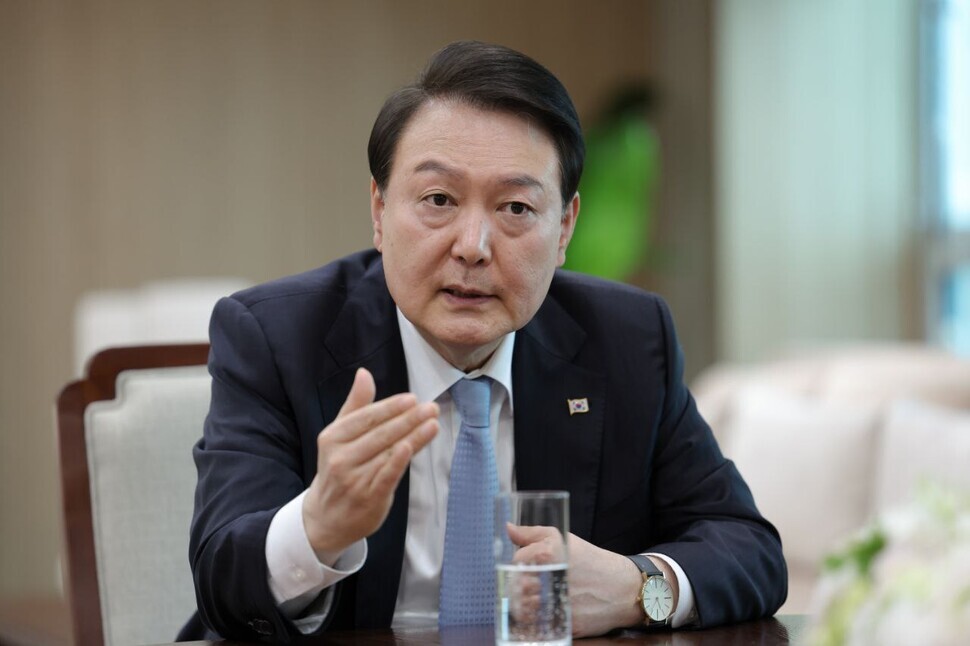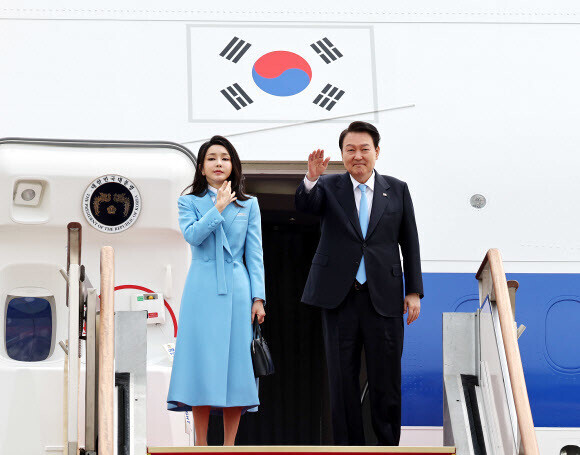hankyoreh
Links to other country sites 다른 나라 사이트 링크
Yoon says he “can’t accept” Japan must kneel over history in WaPo interview

South Korean President Yoon Suk-yeol said in an interview with the foreign press that he “can’t accept the notion” that Japan should be forced to kneel “because of what happened 100 years ago.”
Yoon’s remarks, which came just two days before his summit with US President Joe Biden on Wednesday, evoke statements made by former Japanese Prime Minister Shinzo Abe. They underscore the “unilateral submission” of Yoon\'s stance toward Japan, in which he emphasizes the future at the expense of the past while seeking to improve Korea-Japan relations.
South Korea’s security concerns were “too urgent” to delay cooperation with Tokyo, Yoon was paraphrased as saying in a Washington Post interview that ran on Monday.
“Europe has experienced several wars for the past 100 years and despite that, warring countries have found ways to cooperate for the future,” Yoon said in the interview. “I can’t accept the notion that because of what happened 100 years ago, something is absolutely impossible [to do] and that they [Japanese] must kneel [for forgiveness].”
“This is an issue that requires decision. [. . .] In terms of persuasion, I believe I did my best,” the Korean president added.
His comments imply that the Korean government’s third-party repayment plan to compensate victims of forced labor during Japan’s colonial rule of Korea with donations from South Korean companies rather than Japanese companies who profited from forced labor was his “decision” and that he did everything he could to win over forced labor victims and other Koreans who objected to the plan.
Yoon faces criticism for the “humiliating diplomacy” of unilaterally siding with Japan on the third-party repayment plan, which goes against the spirit of the 2018 ruling by the South Korean Supreme Court that ordered Japanese companies that committed war crimes to compensate the victims of forced labor.
Yoon stressed the need to improve relations with Japan under the banner of a “values alliance.”
“We need to improve our relationship with Japan in light of the spirit of liberal democracy in our Constitution. Countries that share these values can solve problems, whether historical or contemporary, through communication,” Yoon said, according to a supplementary document supplied to the Korean press by the presidential office.

Since taking office, Yoon has aggressively courted Japan while making a stronger alliance with the US, normalized relations with Japan and enhanced cooperation with the US and Japan the core of his foreign policy. All the while, he has emphasized those relationships as being “values alliances” between countries that share liberal democracy, respect for human rights, and the rule of law.
In a commemorative speech for the March 1 Independence Movement last month, Yoon referred to Japan as a ”cooperative partner” for dealing with North Korea’s nuclear threats and the global polycrisis, without making any demands or proposals about historical disputes.
The Yoon administration then announced its plan to have a government-run foundation pay out compensation to forced labor victims on March 6, and Yoon held a summit with Japanese Prime Minister Fumio Kishida in Tokyo on March 16. During the summit, the two leaders agreed to restore “shuttle diplomacy” and normalize Korea and Japan’s information-sharing agreement, known as GSOMIA.
While Japan hasn’t made any significant concessions to South Korea, Yoon’s remarks on Monday essentially absolve Japan of its refusal to own up to its past actions.
His comments are also similar to a statement Abe made in August 2015, when he was still prime minister of Japan. At the time, Abe said, “We must not let our children, grandchildren, and even further generations to come, who have nothing to do with that war, be predestined to apologize.”
Yoon’s remarks can also be seen as an attempt to highlight South Korea’s increasingly close relationship with Japan ahead of the summit with Biden at which strengthening extended deterrence and trilateral security cooperation measures involving Japan will be discussed.
In response to the president’s comments, Democratic Party leader Lee Jae-myung told reporters that “the statement should never have been made” given Yoon’s position as the president of the Republic of Korea, which “suffered decades-long invasion by Japan.”
“The statement calls into question the president’s historical consciousness,” Lee said.
In this latest interview, Yoon did, however, backpedal on the issue of sending military aid to Ukraine.
“Of course, Ukraine is under an illegal invasion, so it is appropriate to provide a range of aid, but when it comes to how and what we will supply, we cannot but consider many direct and indirect relationships between our country and the warring countries,” Yoon said.
His comments to WaPo are more cautious than those he made to Reuters on April 19, when he floated the possibility of sending lethal aid to Ukraine based on certain preconditions, such as a large-scale massacre of civilians.
Regarding the South Korea-US alliance, Yoon said, “It is indeed the most successful alliance in history and, above all, an alliance based on values.”
Yoon and his wife departed for their state visit to the US on Monday to commemorate the 70th anniversary of the South Korea-US alliance.
By Bae Ji-hyun, staff reporter
Please direct questions or comments to [english@hani.co.kr]

Editorial・opinion
![[Column] Season 2 of special prosecutor probe may be coming to Korea soon [Column] Season 2 of special prosecutor probe may be coming to Korea soon](https://flexible.img.hani.co.kr/flexible/normal/500/300/imgdb/original/2024/0426/3317141030699447.jpg) [Column] Season 2 of special prosecutor probe may be coming to Korea soon
[Column] Season 2 of special prosecutor probe may be coming to Korea soon![[Column] Park Geun-hye déjà vu in Yoon Suk-yeol [Column] Park Geun-hye déjà vu in Yoon Suk-yeol](https://flexible.img.hani.co.kr/flexible/normal/500/300/imgdb/original/2024/0424/651713945113788.jpg) [Column] Park Geun-hye déjà vu in Yoon Suk-yeol
[Column] Park Geun-hye déjà vu in Yoon Suk-yeol- [Editorial] New weight of N. Korea’s nuclear threats makes dialogue all the more urgent
- [Guest essay] The real reason Korea’s new right wants to dub Rhee a founding father
- [Column] ‘Choson’: Is it time we start referring to N. Korea in its own terms?
- [Editorial] Japan’s rewriting of history with Korea has gone too far
- [Column] The president’s questionable capacity for dialogue
- [Column] Are chaebol firms just pizza pies for families to divvy up as they please?
- [Column] Has Korea, too, crossed the Rubicon on China?
- [Correspondent’s column] In Japan’s alliance with US, echoes of its past alliances with UK
Most viewed articles
- 1‘We must say no’: Seoul defense chief on Korean, USFK involvement in hypothetical Taiwan crisis
- 2After election rout, Yoon’s left with 3 choices for dealing with the opposition
- 3Why Kim Jong-un is scrapping the term ‘Day of the Sun’ and toning down fanfare for predecessors
- 4AI is catching up with humans at a ‘shocking’ rate
- 5[Editorial] Korea’s surprise Q1 growth requires objective assessment, not blind fanfare
- 6Noting shared ‘values,’ Korea hints at passport-free travel with Japan
- 7Two factors that’ll decide if Korea’s economy keeps on its upward trend
- 8Gangnam murderer says he killed “because women have always ignored me”
- 9South Korea officially an aged society just 17 years after becoming aging society
- 10The dream K-drama boyfriend stealing hearts and screens in Japan